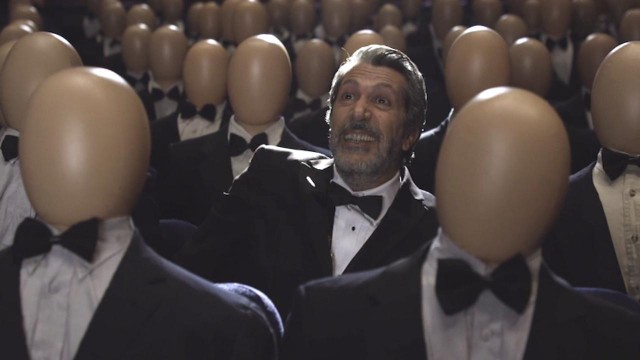The first time I heard Mr. Oizo was during that blissful wild wild west era of the internet just after internet speeds started spiking but before copyright and corporate regulation took over the airwaves. Quentin Dupieux’s video for Flat Beat, starring a cult muppet made by Jim Henson’s Creature Shop named Flat Eric, felt like a transmission beamed from an alternate reality where snark was the dominant form of expression. Flat Eric was a CEO who spoke in beeps and listened to a record made entirely out of a looped beat and drum sample. He would scribble on contracts, eat sausages like they were fine Cuban cigars, and headbang to a defiantly lo-fi beat. The video felt like a sarcastic take on cinema’s classic depictions of executives.
British readers are probably baffled that I would be describing Flat Eric with a sense of alienation. In the UK, Flat Eric was a phenomenon. Flat Beat reached #1 on the UK singles charts (it wasn’t even released as a single in the US), Flat Eric was featured on magazine covers, and Levis used both Flat Beat and Flat Eric in an advertising campaign (the campaign would eventually reach the US with diminished popularity). In the U.S., Flat Eric was almost a hipster-sized blip in pop culture, and Mr. Oizo would all but disappear into the ether of pop culture. In the U.K., Flat Eric would pop up in various other media, including Series One of The Office.
Quentin Dupieux (Mr. Oizo’s actual name) broadsided America a decade later with his feature film Rubber. A cynical post-modern dissection of 1970s grindhouse horror films, Rubber tells the story of a psychokinetic tire who makes things explode with its mind while an audience watches it from the desert hills with binoculars. Dupieux followed Rubber up with Wrong, a pisstake on the modern pseudo-surreal search for identity genre (Garden State), and then Wrong Cops, a sarcastic dissection of the American bad cop farce genre. None of the movies should be taken seriously as all of them are either mocking or directly commenting on the genre they’re sampling. More importantly, they’re constructed with surreal elements designed to make you question the movie you’re watching, as the movies you’ve already watched and the movies you will eventually watch. Dupieux’s films operate on a similar level to Duchamp’s Fountain, the factory made urinal hung on a the wall and declared art. It challenges the idea of art, pushing the discussion from craft toward the intellectual while mocking the snobbery of that conversation.
Reality, Dupieux’s most recent film, is a non-Euclidean Mobius Strip of a film about dreams and Hollywood. A documentary director is making a movie about a girl named Reality who finds a blue VHS tape in a boar and dreams about a director pitching a movie about a girl named Reality who finds a blue VHS tape only to realize his movie may have already been released. There is also a principal who dreams about cross dressing but may or may not indulge in this desire, a producer who shoots surfers from his office, and a guy in a rat suit hosting a television show. Still with me? No? Good. Because Reality doesn’t give a fuck. The looping dreamlike structure resembles David Lynch’s Inland Empire (even replacing rabbits in a sitcom with rats in a cooking show) while the elements about Hollywood film production mimic Mulholland Drive, and the alien plot of boar guts, VHS tapes and alien signals resemble Cronenberg’s Videodrome.
Is Dupieux delivering a sharp critique, a loving rib-nudging post-modern satire, or a poor imitation of the movies he’s directly referencing? Is he being genuine, or is he being aloof in the same manner of Adult Swim (Eric Wareheim even has a bit part in Reality)? He tips his hands in the second to last scene of the movie, a scene spiritually similar to Duchamp’s urinal. Maybe the audience is the punchline. If we are, then the joke is funny…or maybe not.
Reality is streaming on Netflix

